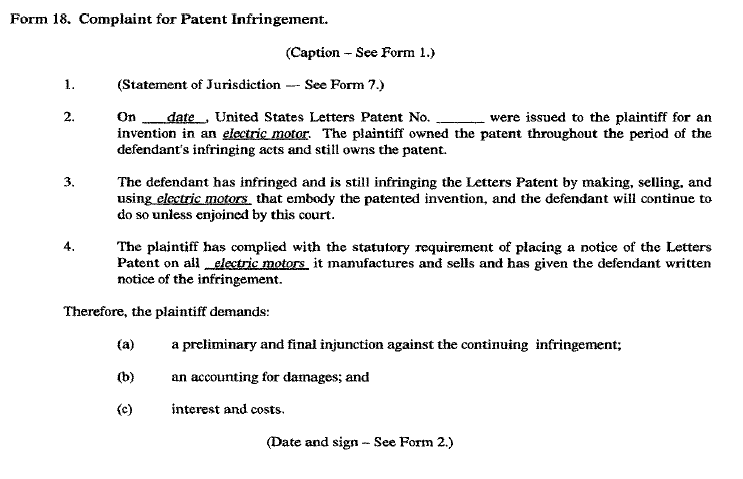In Forbes, Daniel Fisher reported that the Judicial Conference is going to be voting on a small, but critical change to the Federal Rules of Civil Procedure shortly. (The Judicial Conference is a conference of senior federal judges who oversee the federal court system. Among other things, the Judicial Conference makes the rules of procedure for federal courts.)
You may remember that in patent infringement cases, the patent owner can get away with an incredibly vague complaint that tells the accused infringer next to nothing. The reason for this is an obscure form in the Federal Rules. Form 18 is supposed to be an example of a complaint in a patent infringement case. It looks like this:
As you can see, there’s no detail at all. It’s just an empty assertion that someone infringes a patent.
The Supreme Court ruled in a couple of cases, Iqbal and Twombly, that a complaint has to have enough facts in it to support the legal claims. But, thanks to a Federal Circuit decision, that rule doesn’t apply in patent cases. The Federal CircuitSee CAFC relied on Form 18 in making its decision.
Well, the Judicial Conference is going to be voting on an amendment that gets rid of the forms altogether, including Form 18.
The way the process works is that once the Judicial Conference approves an amendment, it goes to the Supreme Court for approval. The Supreme Court typically approves these changes. Once the Supreme Court approves the amendment, it promulgates rules that put the changes into effect on December 1 of the same year. The new rules will go into effect unless Congress passes legislation to reject, modify, or defer the changes. Because Congress has to affirmatively act to stop the changes, usually they just go into effect as is.
With luck, as of December 1, 2015, patent owners (including patent trolls) will have to be more specific in their complaints.
While it would have been nice to have this change sooner, it’s great to see a positive change come out of the whole patent reform debate.

